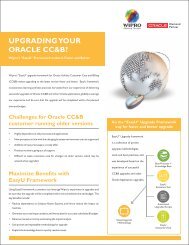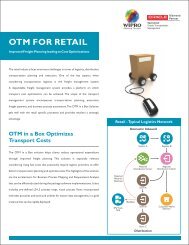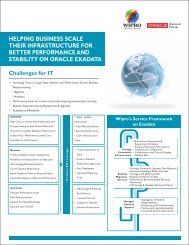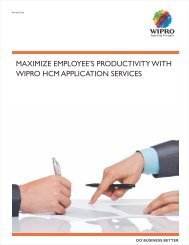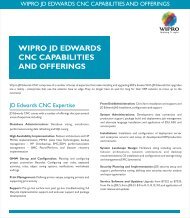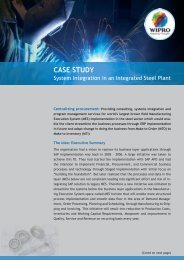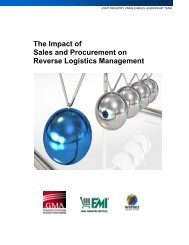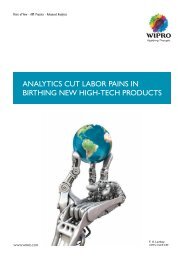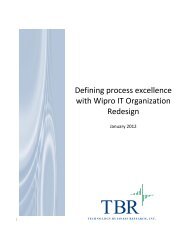Knowledge Management Strategies for Mitigating the Big Crew - Wipro
Knowledge Management Strategies for Mitigating the Big Crew - Wipro
Knowledge Management Strategies for Mitigating the Big Crew - Wipro
Create successful ePaper yourself
Turn your PDF publications into a flip-book with our unique Google optimized e-Paper software.
<strong>Knowledge</strong> <strong>Management</strong> <strong>Strategies</strong> <strong>for</strong> mitigating <strong>the</strong> <strong>Big</strong> <strong>Crew</strong> Change in E&P<br />
Successfully finding and producing oil requires a team of highly trained and experienced engineers. In most oil companies <strong>the</strong><br />
average age of an engineer is 48; 50% will be retiring within 10 years. Un<strong>for</strong>tunately, <strong>the</strong>re are no replacements <strong>for</strong> <strong>the</strong>se<br />
retirees and companies will experience decreased production levels, reduced profitability and an increase in accident rates.<br />
While new college graduates will fill some of <strong>the</strong> gaps, <strong>the</strong>re are nei<strong>the</strong>r enough of <strong>the</strong>se personnel nor do <strong>the</strong>y have <strong>the</strong><br />
necessary skills. <strong>Wipro</strong> believes <strong>the</strong> best way to address this issue is with knowledge communities that keep retirees available as<br />
consultants and with professional networking technologies that improve collaboration.<br />
Executive Summary<br />
The Oil and Gas Industry will be facing an enormous challenge over <strong>the</strong> next decade, when nearly 50% of its work<strong>for</strong>ce will be<br />
eligible <strong>for</strong> retirement. When <strong>the</strong>se employees leave <strong>the</strong>y will be taking <strong>the</strong>ir experience and institutional knowledge with <strong>the</strong>m.<br />
Exploration and Production (E&P) will be particularly hard hit because of its reliance on world class engineering talent. The most<br />
successful engineers are those who have 20 years of experience or more. Finding and producing oil is a combination of instinct<br />
and science. While <strong>the</strong> science can be taught in universities, instincts come from experience. To make matters worse, <strong>the</strong>re are<br />
few mid-career engineers in <strong>the</strong> pipeline to replace <strong>the</strong> seasoned veterans. Depressed oil prices in <strong>the</strong> 1980s and 1990s<br />
significantly decreased <strong>the</strong> number of engineers entering <strong>the</strong> industry. While <strong>the</strong> number of new engineers is increasing, <strong>the</strong>re<br />
will not be enough of <strong>the</strong>m to replace those who are leaving. Even if quantities were sufficient, <strong>the</strong>ir lack of experience would<br />
make <strong>the</strong>m largely ineffective.<br />
The impact on <strong>the</strong> industry will be enormous. As <strong>the</strong> world economy grows, demand <strong>for</strong> fossil fuels increases. At <strong>the</strong> same time,<br />
<strong>the</strong> world’s “easy” oil has already been found. The remaining oil is located is small, engineering-intensive fields, in depleted oil<br />
fields requiring enhanced recovery, and in deep water. Getting at <strong>the</strong>se hydrocarbons will require <strong>the</strong> most talented engineers<br />
with decades of experience. These are <strong>the</strong> same people who are leaving <strong>the</strong> industry.<br />
The demographics of <strong>the</strong> labor market have also changed. While <strong>the</strong>re is a large deficit of engineering talent in North America<br />
and <strong>the</strong> Middle East, <strong>the</strong>re is a surplus of talent in China and India. If oil and gas companies are going to remain competitive,<br />
<strong>the</strong>y are going to have to find a way to tap into this labor pool.<br />
<strong>Wipro</strong>, in conjunction with Microsoft and Rice University, has studied this challenge extensively and believes that a combination<br />
of new business processes and supporting technologies can partially mitigate <strong>the</strong> impact of <strong>the</strong> “<strong>Big</strong> <strong>Crew</strong> Change”. <strong>Wipro</strong>’s<br />
solution is to develop knowledge communities that include on-duty, off-duty, Center of Excellence alumni association<br />
consultants and partners/vendors. New collaborative and communications technologies will allow this group to function in a<br />
virtual environment. One of <strong>the</strong> key innovations <strong>for</strong> this solution is <strong>the</strong> knowledge market where off-duty and retired employees<br />
can work as consultants to solve problems and support projects.<br />
<strong>Wipro</strong>’s solution is based on <strong>the</strong> Microsoft Office SharePoint Server (MOSS) 2007 plat<strong>for</strong>m and includes Microsoft’s Unified<br />
Communications Product suite. The technical solution will support <strong>the</strong> knowledge communities with intranet and extranet<br />
portals and real-time communications. The system will integrate into existing knowledge management, asset management,<br />
condition-based maintenance, SCADA1 monitoring, troubleshooting and ERP2 systems. Professional networking technologies<br />
will link assets to processes to people. Powerful search engines will allow <strong>the</strong> user community to quickly locate in<strong>for</strong>mation and<br />
more importantly, <strong>the</strong> people who have <strong>the</strong> in<strong>for</strong>mation. Mobile communications devices based on Smartphones will make it<br />
possible <strong>for</strong> off-duty and retired employees to be on-call without interfering with <strong>the</strong>ir personal time.<br />
3 | www.wipro.com/industryresearch<br />
WIPRO TECHNOLOGIES




